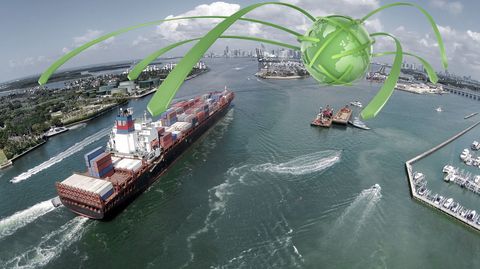Since the election of Donald Trump as the new president of the US, the international trade landscape has been shaken up in a number of important ways - prompting concerns that the modern consensus on open, liberalized free trade could be under threat.
Since taking office, Mr Trump has expressed a number of protectionist sentiments that have caused concern for many key trading partners, as well as pulling the US out of the Trans-Pacific Partnership (TPP). Having fulfilled this campaign pledge, the new president's attentions have turned to another of his regular pre-elections targets for criticism - the North American Free Trade Agreement (NAFTA).
The deal, which entered into force in 1994, has had a significant impact on trading conditions between the US, Canada and Mexico in the last two decades, but the advent of the Trump presidency is likely to mean that the status quo will be altered or upended in the coming years.
What is NAFTA?
NAFTA was originally negotiated during the presidency of George HW Bush as an attempt to incorporate Mexico into a previously bilateral trade relationship between the US and Canada. However, it was his successor Bill Clinton who was able to secure the deal's ratification by the US Congress in 1993, allowing it to come into effect the following year.
As with most free trade agreements, the objective was to eliminate tariffs and other barriers to trade and investment between the three nations, with its various provisions coming into effect gradually over the subsequent decade. For Mexico, NAFTA was designed to underpin accelerated economic growth, while the US and Canada would benefit from an attractive market for exports and a low-cost investment location.
Economic analysis since the implementation of NAFTA has indicated that Mexico has seen a significant benefit from the agreement, with the gains experienced by the US and Canada generally evaluated as being more modest.
Recent developments
Criticism of NAFTA has emerged from both sides of the political spectrum in the last few years, with former president Barack Obama having made a pledge to renegotiate the deal during his election campaign in 2008, while the 2016 campaign trail saw NAFTA attacked by both Mr Trump and prospective Democratic nominee Bernie Sanders.
Much of the critique has stemmed from a perception that NAFTA has led to an exodus of jobs from the US to Mexico, a point that Mr Trump seized upon strongly in his successful election campaign, during which he described NAFTA as "the single worst trade deal ever approved" by the US, while pledging to either renegotiate or pull out of the pact if elected.
Since taking power, the Republican president has stated during a recent meeting with Canadian prime minister that he believes the US' relationship with its northern neighbor requires only a "tweak", while taking a much more aggressive stance towards Mexico, including threats to impose substantial tariffs and border taxes on Mexican goods.
Possible outcomes
Mexico's foreign minister Luis Videgaray and Canadian counterpart Chrystia Freeland have expressed a keenness to ensure that any NAFTA renegotiation talks are conducted with all three nations involved, rather than bilaterally. However, the confrontational nature of the current relationship between the US and Mexico - with Mexican senator Armando Rios recently accusing Mr Trump of a "big lie" in his claims about NAFTA's impact - is likely to make this a difficult proposition.
The White House stance is that any refusal by Canada and Mexico to accept a renegotiation of NAFTA that provides a "fair deal" for US workers would results in the country's withdrawal, which could result in the implementation of import tariffs under World Trade Organization regulations. However, it remains unclear how the US-Canada and Canada-Mexico trade relationships would be affected in the longer term, given that the current controversy over NAFTA primarily relates to the US-Mexico dynamic.
A recent survey from Gallup has indicated that 48 per cent of Americans believe NAFTA has been good for the US on balance, compared to 46 per cent who view the deal's impact as negative. Economists have also warned that a collapse of NAFTA would have a damaging impact on US businesses including carmakers, electronics firms and fruit sellers, as all of these sectors depend heavily on imports from south of the border.
As yet, a clear picture of the future of NAFTA is yet to emerge - but the rhetoric expressed by Mr Trump indicates that it is likely to look quite different.






